The area of the so called “Great” Brno emerged when the city centre and the surrounding villages merged together, which contributes to its specific nature. You can merely stretch out your hand, take a few steps and you find yourself in the countryside. Folk traditions are so close to the city centre that they actually feel like home there.
Brno, even though it is a relatively large city, has always been close to folk culture. Physical closeness was based on the fact that suburban municipalities – such as Bohunice, Židenice (and also Juliánov), Jundrov or Líšeň - had their specific folklore character. Folk songs which were recorded there in the past two centuries put together the Hanakian (the Central Moravian) and the northern region of Podhorácko. They distinctly differ from South Moravian folklore (to put it simply – Moravian Wallachia and Moravian Slovakia), which is on the outside linked to the characteristics of “Moravian folklore” and nowadays is represented mainly by the cymbalo music. While the original traditions of the Brno area gravitate towards the west due to the musical nature, smoothly joining Czech folklore as well as German; the other is related to the Slovak, Hungarian and partly the broadly encompassed Carpathian culture, which stretches into Ukraine and Romania.
Although the second type, i.e. the attractive eastern folklore was not present originally, it was brought in the previous centuries by the people from the south-eastern Moravian regions who came to the centre to study or to work. As they missed the songs associated with their homes, they started to gather and keep their folklore traditions. In 1908 Slovácký krúžek was established, which has raised thousands of singers and musicians until now, who shared the love of the songs, dances and customs of Moravian Slovakia. Based on similar grounds, Valašský krúžek was established in 1946. During the period of the so called First Republic, Slovácký krúžek became the basis and source of Czechoslovak Radio and its station in Brno broadcasting (established in 1924). In the 1930s and in the period of the Nazi protectorate the Moravian folk songs performed by the group (and featuring the legendary solo singer Boženka Šebetovská) represented one of the important attributes of the distinctive broadcasting in Brno; moreover, during the war it helped to boost national awareness in the oppressive atmosphere of the protectorate.
Folklore as an ever flowing sap and the subject of research
The contact with living Moravian folklore in Brno was important and inspiring for scholars in general. The priest František Sušil (1804-1868), one of the leading representatives of the National Revival in Moravia, put in much effort in collecting Moravian folk songs and created a collection of Moravian folk songs, which represented the source for younger generations of folklore lovers, composers, ethnographers, and later also folklore ensembles and which remains unsurpassed in many aspects. The collection is alive still and provides us with many surprises: a prime example is the Čechomor band and their most popular songs which originate from Sušil’s collection. The connection of Sušil’s collection is of course closely linked to composers Leoš Janáček and Bohuslav Martinů.
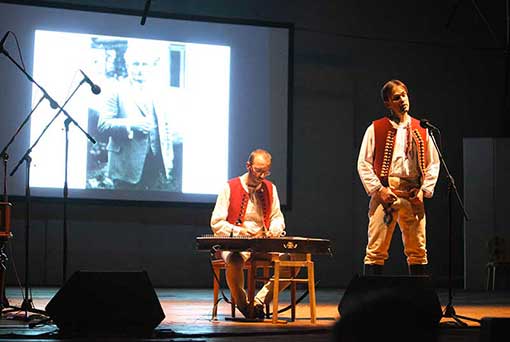 Brno – besides being a space where folklore thrives – has been associated with the Moravian folklore tradition through the activities of many institutions. The pioneer of the first folk music audio recordings was Leoš Janáček, who recorded dozens of phonographic records before the First World War. A selection from these recordings formed the base for the publication called Nejstarší zvukové záznamy moravského a slovenského lidového zpěvu (Gnosis Brno 1998) (The Oldest Audio Recordings of Moravian and Slovak Folk Singing) in 1998, which received a great and complimentary review in the prestigious British Gramophone Magazine. A definitive and carefully described edition of these unique recordings was published under the title Vzaty z fonografu (Taken from a Phonograph) in 2012 by the Institute of Ethnology of the Academy of Sciences of the Czech Republic, which places Janáček’s pioneering work and Moravian folklore in the European context along with the impressive work of the Hungarian composer Béla Bartók. The Department of European Ethnology at Masaryk University has a long term goal of the careful mapping of Moravian folklore, similar to the Brno branch of the Institute of Ethnology of the Academy of Sciences of the Czech Republic. It also expanded its interest to the cultures of ethnic minorities and the German population, which was abundant in Brno until the end of the Second World War and to the cultural exchange with Vienna, which was closer to Brno in the past than Prague. Those who deal with the work of Leoš Janáček or other composers of Brno must step into the abundant field of Moravian folk music – either the Department of Musicology at Masaryk University or the Department of the History of Music of the Moravian Museum. However, the list of editions of these important institutions is beyond the goals of this text. The Museum of Romani Culture deals with the traditional Romani folk cultures in Moravia and Slovakia.
Brno – besides being a space where folklore thrives – has been associated with the Moravian folklore tradition through the activities of many institutions. The pioneer of the first folk music audio recordings was Leoš Janáček, who recorded dozens of phonographic records before the First World War. A selection from these recordings formed the base for the publication called Nejstarší zvukové záznamy moravského a slovenského lidového zpěvu (Gnosis Brno 1998) (The Oldest Audio Recordings of Moravian and Slovak Folk Singing) in 1998, which received a great and complimentary review in the prestigious British Gramophone Magazine. A definitive and carefully described edition of these unique recordings was published under the title Vzaty z fonografu (Taken from a Phonograph) in 2012 by the Institute of Ethnology of the Academy of Sciences of the Czech Republic, which places Janáček’s pioneering work and Moravian folklore in the European context along with the impressive work of the Hungarian composer Béla Bartók. The Department of European Ethnology at Masaryk University has a long term goal of the careful mapping of Moravian folklore, similar to the Brno branch of the Institute of Ethnology of the Academy of Sciences of the Czech Republic. It also expanded its interest to the cultures of ethnic minorities and the German population, which was abundant in Brno until the end of the Second World War and to the cultural exchange with Vienna, which was closer to Brno in the past than Prague. Those who deal with the work of Leoš Janáček or other composers of Brno must step into the abundant field of Moravian folk music – either the Department of Musicology at Masaryk University or the Department of the History of Music of the Moravian Museum. However, the list of editions of these important institutions is beyond the goals of this text. The Museum of Romani Culture deals with the traditional Romani folk cultures in Moravia and Slovakia.
Czech Radio Brno: Moravian music culture memory and its active agent
The activities of Czech Radio Brno (formerly Czechoslovak) represent an independent chapter. Throughout its entire existence it has been a mirror of the living Moravian music culture – especially the folk one. Many precious recordings of the regional folklore since the end of the 1940s are stored in its archives as well as the monumental cultural mark, which was left there by the Brno Radio Orchestra of Folk Instruments (BROLN). It was founded in 1952 for the needs of the radio broadcast to replace irregular and non-systematic amateur production with professional work, which shifted the quality of the level of the broadcasted music higher and retrospectively influenced the development of folk ensembles in the regions. During its existence, BROLN produced thousands of records.
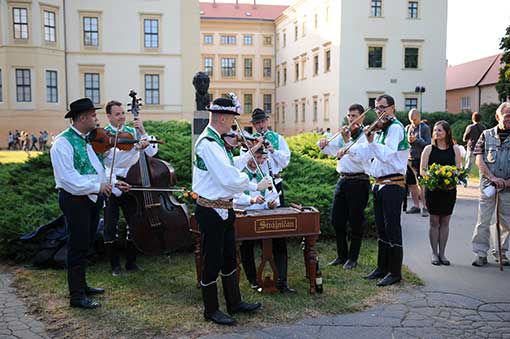 When BROLN was founded, the Radio did not give up the recording and presenting of regional culture, but the base for regular broadcast was the systematic work of the radio body, which, apart from trained musicians, also employed good folk musicians, especially folk singers. The names of Božena Šebetovská, Jožka Severin, Jarmila Šuláková or the brothers Dušan and Luboš Holých were extraordinarily popular in the 1950s and 1960s and even looking at the situation now it is obvious that they possessed a timeless quality. BROLN had a wide berth due to its focus and facilities – from interpretation of folk songs to the overlap into classical music. Long-time artistic manager Bohumil Smejkal (the later primario of the world-wide famous Janacek Quartet) was a guarantee of a high interpretation level. BROLN (which was dramaturgically based on the legacy of Janáček) cooperated with a wide range of composers from Brno (starting with Josef Berg, up to Miloš Štědroň).
When BROLN was founded, the Radio did not give up the recording and presenting of regional culture, but the base for regular broadcast was the systematic work of the radio body, which, apart from trained musicians, also employed good folk musicians, especially folk singers. The names of Božena Šebetovská, Jožka Severin, Jarmila Šuláková or the brothers Dušan and Luboš Holých were extraordinarily popular in the 1950s and 1960s and even looking at the situation now it is obvious that they possessed a timeless quality. BROLN had a wide berth due to its focus and facilities – from interpretation of folk songs to the overlap into classical music. Long-time artistic manager Bohumil Smejkal (the later primario of the world-wide famous Janacek Quartet) was a guarantee of a high interpretation level. BROLN (which was dramaturgically based on the legacy of Janáček) cooperated with a wide range of composers from Brno (starting with Josef Berg, up to Miloš Štědroň).
In the current age of re-editions, recordings older than fifty or even more years have started to appear and it is evident that they fully belong to our distinctive cultural legacy. The re-edition of the first album of Jarmila Šuláková recorded with BROLN (Kyčera, Kyčera, Galén 2014) with many bonuses is proof of that. The upcoming selection of BROLN recordings from the 1950s preserved in the Supraphon archive and also published in Galén will show that the marginal production of that period (nowadays a reason for occasional condemnation) cannot overshadow the basic musical message, i.e. the passing of the essence of Moravian and Slovak folk music and the development of its interpretation, which had its roots already in the pre-war period, when the last folk musicians were dying out and songs were taken over by young students, often already well educated in music.
The ways of Moravian folklore towards today
In the regions of south-eastern Moravia, which are closest to Brno and communicate with it, there are about 200 active folk ensembles, which have a musical and dance component. This number does not include any spontaneously formed or more or less occasional groups of musicians. BROLN is still active in the Czech Radio (but not only there) and the similar tradition of a small orchestra body includes the Military Art Ensemble Ondráš, which originally focused on Slovak folklore but later also expanded to Moravian folklore and in its performances the high quality musical component and dance choreography are combined.
Thanks to the Czech Radio Brno, which is thought highly of in Moravian regions and owing to folklore festivities, where the first place belongs to the festival in Strážnice (this year it is seventy years from its foundation!), we could observe the life of Moravian (and not only that) folk music with a finger at its pulse during the decades. And we still can until today, as Czech Radio Brno is still in contact with the regional culture. One of the overall views of the development of Moravian folk music is a two-disc set Proměny v čase (Gnosis Brno, 2001) (Transformations in Time), which enables us to compare old village musical class with the folklore production at the turn of the millennium. Without radio archives this would never be possible.
The previous regime supported folklore, because it was used as a barrier against the influence of western pop-culture. On one hand, this support contributed to the development of the folk ensemble movement, on the other hand, it paradoxically reduced its prestige with people that were not immediately connected to it. After 1989 there was a question: How will Moravian folklore survive in the open and democratic society? Nowadays we already know the answer: Folklore is alive and paradoxically it is even more intense and with a wider base than before. It is once again becoming a solid part of the local and regional identity and it is absolutely natural: A true partner in Europe without borders can only be one that comes from somewhere and with an autonomous culture. And the mutual understanding of these cultures leads to mutual respect.
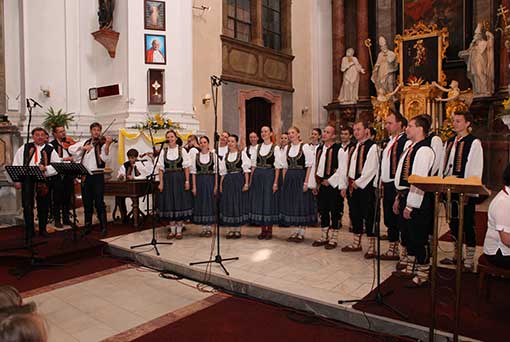 In communities there are spontaneously renewed traditions, especially the ones associated with the liturgical year, which were ideologically inconvenient in the totalitarian socialism. The festival in Strážnice has a large attendance – tens of thousands of young people! In the suburban areas of Brno (Líšeň, Jundrov, Medlánky, Bohunice and others) the old folk traditions, which provide the peculiar features of the area, have been renewed.
In communities there are spontaneously renewed traditions, especially the ones associated with the liturgical year, which were ideologically inconvenient in the totalitarian socialism. The festival in Strážnice has a large attendance – tens of thousands of young people! In the suburban areas of Brno (Líšeň, Jundrov, Medlánky, Bohunice and others) the old folk traditions, which provide the peculiar features of the area, have been renewed.
Folklore pulse of Brno today
Brno itself is one large field where various activities take place: there are more than 30 folklore groups, out of which about two thirds participate in the Association of Friends of folklore in Brno, which holds the International folklore festival in Brno annually. The festival is part of the festival network within the international organization C.I.O.F.F. and it attempts to keep in touch with similar festivals in Poland, Slovakia, Hungary, Switzerland and Ukraine. Folklore groups in Brno stem from various traditions: Moravian Slovakia or Wallachia to name but a few Moravian traditions; however, the mosaic is varied and colourful – there are groups which perform both Slovakian folk music as well as Bulgarian or Greek dances.
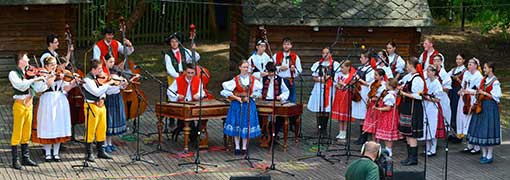 When we take a look away from the ensembles, there are occasions when we can hear cymbalo music at restaurants or celebrations; and it does not have to be only cymbalo music, we can also come across various more or less occasional groups, the repertory of which is extensive – there are Moravian, Romani, Slovak melodies and sometimes also Hungarian and Romanian melodies. In the streets of Brno you can come across either local or passing musicians, folk songs or swing melodies can be heard, as befits a proper European cultural city.
When we take a look away from the ensembles, there are occasions when we can hear cymbalo music at restaurants or celebrations; and it does not have to be only cymbalo music, we can also come across various more or less occasional groups, the repertory of which is extensive – there are Moravian, Romani, Slovak melodies and sometimes also Hungarian and Romanian melodies. In the streets of Brno you can come across either local or passing musicians, folk songs or swing melodies can be heard, as befits a proper European cultural city.
Whoever manages to get to a community, where people sing and dance, be it either the Slovácký krúžek ensemble or any other ensemble, at the folklore jam in the small attic gallery Místogalerie na Skleněné louce or a visit to any Brno club or restaurant, they find themselves in a world with an impressive and refreshing atmosphere, where not only Moravian tradition, wine cellars, estates in the Kopanice region at the Moravian-Slovak border, but also the spirit of Bratislava or Budapest is reflected. The culture of Brno is a peculiar mosaic embedded in Moravia, however, at the same time it is – at least its folklore aspect – partially the musical mirror of East-Central Europe.





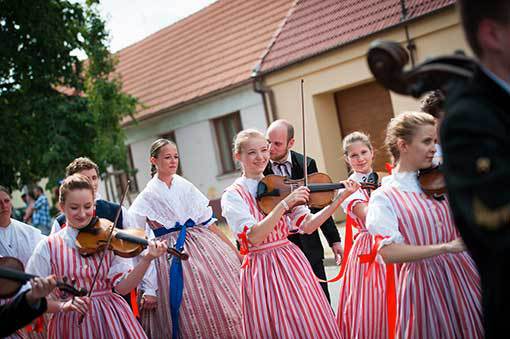


























No comment added yet..